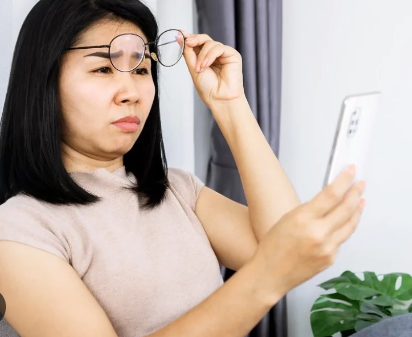Hyperopia (Farsightedness)

Understanding Hyperopia (Farsightedness): Causes, Symptoms, and Treatments
Introduction
Hyperopia, also known as farsightedness, is a common vision condition where distant objects can be seen more clearly than nearby objects. This happens because the light entering the eye is focused behind the retina instead of directly on it. Hyperopia can affect people of all ages, though it is often more noticeable in adults as the eye's focusing ability declines with age.
Causes of Hyperopia
- Shortened Eyeball:
- The most common cause is when the eyeball is too short from front to back, preventing light from focusing correctly on the retina.
- Abnormal Corneal Shape:
- In some cases, the cornea may be too flat, reducing its ability to bend light properly onto the retina.
- Genetics:
- Hyperopia often runs in families, meaning genetic factors can contribute to its development.
Symptoms of Hyperopia
- Blurred Vision (Especially Up Close): Difficulty seeing close objects clearly, while distant objects may remain in focus.
- Eye Strain: Tired or strained eyes, especially after reading or doing close work.
- Headaches: Frequent headaches may occur after prolonged periods of focusing on nearby objects.
- Squinting: People with hyperopia may squint to improve focus on close objects.
- Difficulty with Reading: Holding books or phones at a distance to see text more clearly is common.
Home Remedies and Lifestyle Changes for Hyperopia
- Frequent Breaks from Close Work:
- Follow the 20-20-20 rule: Every 20 minutes, look at something 20 feet away for 20 seconds to reduce eye strain.
- Proper Lighting:
- Ensure good lighting when reading or working to reduce eye strain.
- Balanced Diet:
- Foods rich in vitamins A, C, and E, as well as omega-3 fatty acids, help maintain good eye health.
- Eye Exercises:
- Some people find relief from hyperopia symptoms by doing eye exercises designed to improve focusing skills, though the effectiveness is debated.
Clinical Treatments for Hyperopia
- Prescription Eyeglasses:
- Glasses with convex lenses are commonly prescribed to correct farsightedness. These lenses help focus light directly onto the retina.
- Contact Lenses:
- Contact lenses can provide clear vision for those who prefer not to wear glasses. Options include soft lenses or rigid gas-permeable lenses.
- Laser Eye Surgery:
- Procedures such as LASIK or PRK can reshape the cornea to improve the eye’s focusing ability and reduce the need for glasses or contacts.
- Refractive Lens Exchange (RLE):
- In cases where laser surgery isn't an option, RLE can replace the eye’s natural lens with an artificial one to correct vision.
Alternative/Non-Invasive Treatments for Hyperopia
For hyperopia (farsightedness), while the therapies offered at Earl Claytont Wellness Centre do not directly treat the condition, some may support overall eye health, which could be beneficial in managing strain and discomfort related to hyperopia. These include:
- NAD+ Therapy:
- NAD+ therapy helps with cellular repair and regeneration, which may support eye health by reducing oxidative stress and supporting tissue health in the eyes. While it won't correct hyperopia, it may help improve overall eye function and reduce strain.
- Vitamin B Complex:
- B vitamins, especially B2 (riboflavin) and B12, are important for maintaining eye health. Riboflavin can protect the eyes from oxidative damage and support healthy vision, while other B vitamins help maintain the health of nerves and tissues in the eye.
- PEMF (Pulsed Electromagnetic Field Therapy):
- PEMF therapy may help improve circulation to the eyes, reduce eye strain, and support overall eye health, although it won't correct hyperopia itself.
These therapies can help support eye health and reduce the strain associated with hyperopia, but corrective lenses or medical interventions are typically required to address the condition itself.
Discover the perfect treatment for you with a FREE MEDICAL ASSESSMENT! Limited slots available – secure yours now by scheduling an appointment. Click below to book now!
When to Seek Medical Attention
- Persistent Blurred Vision: If hyperopia affects your daily life, or you experience significant changes in vision, consult an eye doctor.
- Frequent Headaches or Eye Strain: If these symptoms occur regularly, professional assessment may be needed to determine the appropriate corrective measures.
Conclusion
Hyperopia, or farsightedness, is a manageable condition that can be corrected with glasses, contact lenses, or surgery. Regular eye check-ups and early treatment can ensure clear vision and prevent discomfort from eye strain.

